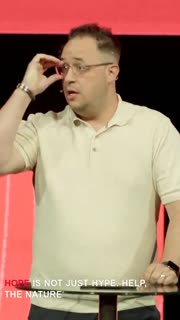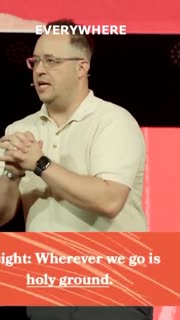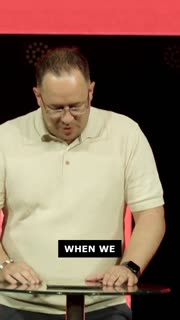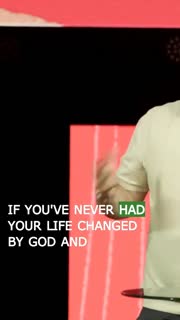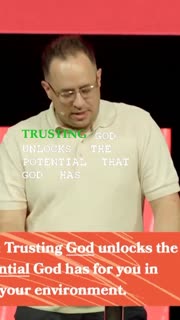Creating Atmospheres of Hope Through Our Words
Devotional
Sermon Summary
Bible Study Guide
Sermon Clips
### Quotes for Outreach
1. "What comes out of our mouths affects our atmosphere. Electrifying. We create the atmosphere. So what we say matters. There's incredible power in our words. Maybe even what we don't say matters. Not just what we do say. Rabbi Abraham Joshua Hessel says, our words create worlds. It's a fascinating detail woven into the creation story how to think about this value." [35:46] (30 seconds)
2. "Hope is not just hype. Help, the nature of helping others, serving other people, is tied to the very nature of Jesus. Jesus came not to be served but to serve. And his disciples were clear on it and wrote about it. When you genuinely connect with God, you genuinely experience hope, and you experience his help, what Jesus has done, you then become a steward of everything that God has done for you toward other people until the day that you die. You get to steward that." [43:33] (37 seconds)
3. "Everywhere you go is holy ground. Well, what do you mean by that, Preston? In the Old Testament, we read about God's Spirit dwelling within the temple, in the Holy of Holies. In the New Testament, we read that it dwells in another place. It's indwelling of the believer, the person who chooses to place their faith, hope, and trust in Jesus, and they are filled with the Spirit. And it's why Paul would write, your body is a temple of the living God, not just to help us understand that our bodies matter and taking care of them matter, but that now, everywhere you go, you have the Spirit of God within you. Therefore, everywhere you go, is holy." [45:28] (42 seconds)
4. "When we genuinely experience a God who loves us, the natural reaction is to begin to do what God did in creation like we just looked at. We start to say some things that start to change some environments. We start to build some people up because there's real hope that we've experienced that we can give away. We start to serve because there's things that we can do to help other people out and help them experience God." [44:05] (22 seconds)
5. "If you've never had your life changed by God and you've never genuinely experienced him, there'll be a hope team up here. You can do that today. You say, God, I want to go all in with you. You can start there. But if you're here and you're already following Jesus, jump in. That's what's electrifying. If it feels boring right now, it's because you're not jumping in. I promise. There's opportunity. There's excitement. It's not always buttoned up. It's a little messy. And it can look like work sometimes. But if you truly have been changed by the love of God, you've been deposited with real hope, you have some things to offer." [01:04:33] (34 seconds)
### Quotes for Members
1. "Trusting God unlocks the potential that God has for you in your environment. Maybe you've heard of this conversion before. It's pretty crazy. We always hear the headline. Terrorist becomes apostle and missionary after radical encounter with God. So while I'm not here to say that that is normative, I think Ananias' response is really an important secondary narrative that is much more normative for us. While Saul becoming Paul is a headline, rightfully so, in order for Paul's potential to be discovered, it took the simple and courageous obedience of Ananias." [52:08] (34 seconds)
2. "God's plan was already in motion. The verse says, he is praying to me right now. I have shown him a vision of a man named Ananias coming in and laying hands on him so he can see again. Could I remind you today that God never sleeps nor slumbers. And every space that you step into today, he's at work toward a desired outcome. You are his plan A. I am his plan A. We, the church, are his plan A. And if you can't get excited about that, I don't know how to give you some more juice in your veins. The creator of the universe invites you to join him and his work in all of creation." [53:04] (32 seconds)
3. "So the question I want to leave you with to embody this value is do I reflect the temperature? Thinking of the environments I'm in, do I just reflect the temperature? No. I'm just here. Maybe I'm just consuming and I like it and there's good. There's a time and a place for that, but there is a maturing piece that says, well, now I'm going to contribute. I'm going to jump in. I'm going to help change the temperature of the places I'm in. The opportunity for our church and our school is enormous, but I'm telling you, we get there because people choose to say, you know what, I'm going to jump in. I'm going to be electrifying. I'm going to help with whatever's needed." [01:03:34] (39 seconds)
4. "When Ananias followed God's command to go, Saul ultimately became Paul and ended up writing most of the New Testament as we know it in our Bibles. Missionary journeys, three of them, starting churches all over the world. Investing in leaders was included with the disciples as the one who had spent time with Jesus even though he never really did. He had that kind of reputation of the kind the other side of what God has already told you. What's on the other side of what God has already told you? Creating the atmosphere in our homes, in our workplaces, in our communities, I would submit to you that it's not a lack of information that's gonna change those atmospheres." [54:16] (42 seconds)
5. "So, what do I mean by that? How does that impact my everyday life? Well, I don't know what you do, and I don't have the time to ask everybody in the room what you do, but here's what I would hope it would mean for you. Now, every interaction you have, if you were a follower of Jesus, every interaction you have, God has a desired outcome for that interaction. Every relationship you have in your life, God has a desired outcome for that relationship. And because of that, you having something indwelling within you as a follower of Jesus should inform the direction of that relationship, the direction of how you approach your career." [47:04] (40 seconds)
Ask a question about this sermon
1. "What comes out of our mouths affects our atmosphere. Electrifying. We create the atmosphere. So what we say matters. There's incredible power in our words. Maybe even what we don't say matters. Not just what we do say. Rabbi Abraham Joshua Hessel says, our words create worlds. It's a fascinating detail woven into the creation story how to think about this value." [35:46] (30 seconds)
2. "Hope is not just hype. Help, the nature of helping others, serving other people, is tied to the very nature of Jesus. Jesus came not to be served but to serve. And his disciples were clear on it and wrote about it. When you genuinely connect with God, you genuinely experience hope, and you experience his help, what Jesus has done, you then become a steward of everything that God has done for you toward other people until the day that you die. You get to steward that." [43:33] (37 seconds)
3. "Everywhere you go is holy ground. Well, what do you mean by that, Preston? In the Old Testament, we read about God's Spirit dwelling within the temple, in the Holy of Holies. In the New Testament, we read that it dwells in another place. It's indwelling of the believer, the person who chooses to place their faith, hope, and trust in Jesus, and they are filled with the Spirit. And it's why Paul would write, your body is a temple of the living God, not just to help us understand that our bodies matter and taking care of them matter, but that now, everywhere you go, you have the Spirit of God within you. Therefore, everywhere you go, is holy." [45:28] (42 seconds)
4. "When we genuinely experience a God who loves us, the natural reaction is to begin to do what God did in creation like we just looked at. We start to say some things that start to change some environments. We start to build some people up because there's real hope that we've experienced that we can give away. We start to serve because there's things that we can do to help other people out and help them experience God." [44:05] (22 seconds)
5. "If you've never had your life changed by God and you've never genuinely experienced him, there'll be a hope team up here. You can do that today. You say, God, I want to go all in with you. You can start there. But if you're here and you're already following Jesus, jump in. That's what's electrifying. If it feels boring right now, it's because you're not jumping in. I promise. There's opportunity. There's excitement. It's not always buttoned up. It's a little messy. And it can look like work sometimes. But if you truly have been changed by the love of God, you've been deposited with real hope, you have some things to offer." [01:04:33] (34 seconds)
### Quotes for Members
1. "Trusting God unlocks the potential that God has for you in your environment. Maybe you've heard of this conversion before. It's pretty crazy. We always hear the headline. Terrorist becomes apostle and missionary after radical encounter with God. So while I'm not here to say that that is normative, I think Ananias' response is really an important secondary narrative that is much more normative for us. While Saul becoming Paul is a headline, rightfully so, in order for Paul's potential to be discovered, it took the simple and courageous obedience of Ananias." [52:08] (34 seconds)
2. "God's plan was already in motion. The verse says, he is praying to me right now. I have shown him a vision of a man named Ananias coming in and laying hands on him so he can see again. Could I remind you today that God never sleeps nor slumbers. And every space that you step into today, he's at work toward a desired outcome. You are his plan A. I am his plan A. We, the church, are his plan A. And if you can't get excited about that, I don't know how to give you some more juice in your veins. The creator of the universe invites you to join him and his work in all of creation." [53:04] (32 seconds)
3. "So the question I want to leave you with to embody this value is do I reflect the temperature? Thinking of the environments I'm in, do I just reflect the temperature? No. I'm just here. Maybe I'm just consuming and I like it and there's good. There's a time and a place for that, but there is a maturing piece that says, well, now I'm going to contribute. I'm going to jump in. I'm going to help change the temperature of the places I'm in. The opportunity for our church and our school is enormous, but I'm telling you, we get there because people choose to say, you know what, I'm going to jump in. I'm going to be electrifying. I'm going to help with whatever's needed." [01:03:34] (39 seconds)
4. "When Ananias followed God's command to go, Saul ultimately became Paul and ended up writing most of the New Testament as we know it in our Bibles. Missionary journeys, three of them, starting churches all over the world. Investing in leaders was included with the disciples as the one who had spent time with Jesus even though he never really did. He had that kind of reputation of the kind the other side of what God has already told you. What's on the other side of what God has already told you? Creating the atmosphere in our homes, in our workplaces, in our communities, I would submit to you that it's not a lack of information that's gonna change those atmospheres." [54:16] (42 seconds)
5. "So, what do I mean by that? How does that impact my everyday life? Well, I don't know what you do, and I don't have the time to ask everybody in the room what you do, but here's what I would hope it would mean for you. Now, every interaction you have, if you were a follower of Jesus, every interaction you have, God has a desired outcome for that interaction. Every relationship you have in your life, God has a desired outcome for that relationship. And because of that, you having something indwelling within you as a follower of Jesus should inform the direction of that relationship, the direction of how you approach your career." [47:04] (40 seconds)

